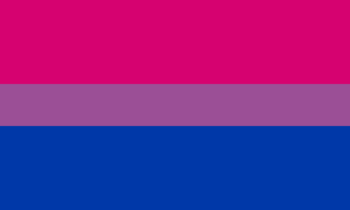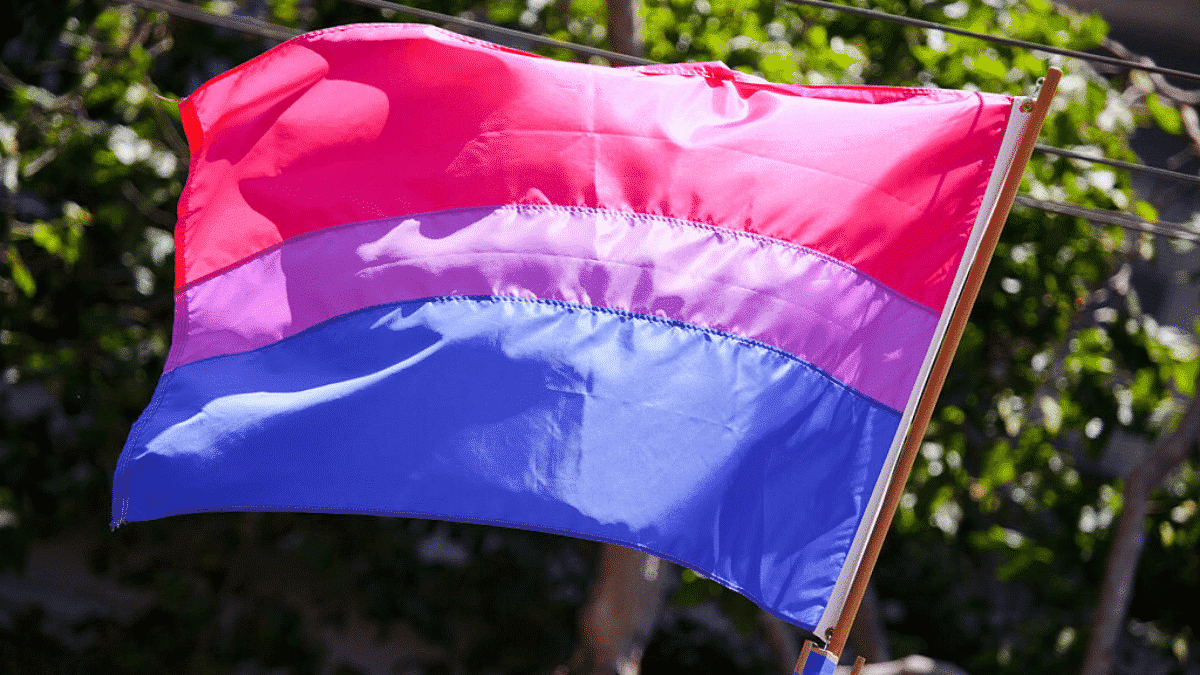The Copyright Battle Over the Bisexual Pride Flag
When a symbol becomes a copyright battle...

Dating back to 1987, BiNet USA is a charity and advocacy group that supports bisexual people of all varieties and helps fight for their inclusion within the LGBTQ+ community and outside of it.
However, yesterday the organization caused an uproar among its own community when they announced via Twitter that they were the copyright holder of the Bisexual Pride flag and were going to begin enforcing their rights starting then. The first tweet even called on the Human Rights Campaign (HRC), the nation’s largest LGBTQ+ civil rights organization, to remove bisexual pride flag from their website where they were offering it as a Zoom background.
They then went on a few hours later to tweet to bisexual artist and author Jayne B Shea, asking her to remove the flag from her website. They went on to say, “We hope we can work a new deal!”
To put it modestly, the new heavy-handed approach did not go over well with the bisexual community. The term “ratioed” is appropriate as nearly all of BiNet USA’s tweets on the subject were greeted with few likes but hundreds of angry comments, many daring the organization to sue them.
However, underneath all of the anger lies a simple question: Can BiNet USA (or anyone else) claim copyright on the Bisexual Pride flag? To answer that, we need to take a look at the history of the flag and a somewhat deep dive into both copyright and trademark.
A Brief History of the Bisexual Pride Flag
The origin of the bisexual pride flag is one of the issues at contention. The flag was unveiled on December 5, 1998, and, according to most sources, was created by Michael Page.
At the time, Page was doing volunteer work for BiNet USA and, according to his account of the creation, he was inspired to create a symbol that bi people could rally around. He created the flag using three colors, a thick pink stripe, a thick blue stripe and a thin middle purple stripe between them to represent the nature of sexual attraction for bisexual people.
At the time, Page made it very clear that he wanted the flag to be used broadly, saying that:
The Bi Pride Flag is the only bisexual symbol not patented, trademarked or service marked.
Michael Page
However, BiNet USA dispute this narrative saying that the bisexual pride flag was created, “In conversation with Michael Page” and that it was ultimately they that made it and, thus, own it.
They said they simply have not chosen to enforce their rights until yesterday, though they did not specify why the change. However, they did say they are happy for non-profit organizations to make use of the flag as long as they don’t, “Require bisexuals do something to be seen with our own flag.”
According to their original tweet, they objected to the HRC’s requirement users subscribe to their mailing lists to download the flag.
Needless to say, this new approach to the bisexual pride flag is not popular with the bisexual community and has resulted in a very vocal backlash against the organization.
But that leaves the question unanswered: Can they claim copyright in the flag and, if so, what can they do with it?
Questionable Copyright Arguments
Disclosure: Though I have 20 years of experience working in copyright, including 15 writing this site, and work as an expert witness, I am not a lawyer and that nothing in this constitutes legal advice in any way.
Many on Twitter question BiNet USA’s question of ownership, noting that Page has long been credited as the creator of the flag without BiNet USA, or anyone else, challenging it. However, Page was a volunteer with BiNet USA at the time and their claim is that they created the flag in “conversation” with Page.
Setting aside all of the other legal issues for a moment, Page, as a volunteer, was not an employee of BiNet USA. This means that the work is not automatically considered a work for hire. To be clear, it could still be one, but only if there was an agreement in place before the work was created that explicitly said so. While we can’t know what happened in 1998, there’s no evidence of any work for hire agreement or another kind of transfer.
If BiNet USA is arguing that their own people contributed to the flag and did enough of the work to qualify for copyright protection, they have a separate problem. Since they’ve admitted that the work was created “in conversation” with Page, Page would likely be a co-author. This would give him the same rights to license the work as BiNet USA and the same ownership stake. Once again, this is barring any agreements we don’t know about.
But even if BiNet USA can claim to be the sole creator of the flag, they have another serious problem: It’s dubious as to whether the flag can be protected by copyright at all.
The flag itself is three colors in a ratio, namely 2:1:2. It’s a simple geometric design and likely doesn’t qualify for copyright protection.
This is a widely-held view about the flag with even Wikipedia saying that the flag is in the public domain. In general, geometric patterns and specific colors can not be protected by copyright. While there’s no doubt creating the flag took a good deal of creativity, it’s not the kind of creativity copyright protects.
As such, there are many significant obstacles to BiNet USA enforcing this would-be copyright. One of the biggest being that, despite multiple searches, I could find no evidence that the work was registered with the U.S. Copyright Office. Though such registration is not required to enjoy copyright protection, it is required to file a lawsuit.
Though there are still a lot of things we don’t and can’t know, BiNet USA’s claims of copyright protection and ownership appear to be weak at best.
What About Trademark?
Though trademarks are a very different form of intellectual property, they could, theoretically, be used by BiNet USA to exert control of the bisexual pride flag.
However, those claims would be on an even worse footing. Not only was any trademark or service mark declined by Page when the flag was created, but such a trademark claim has not been enforced in 22 years in spite of broad usage.
Trademarks, unlikely copyrights, require continued enforcement and maintenance in order to remain valid. Even if there had been a valid trademark claim on the flag in 1998, there likely wouldn’t be today as the flag is associated with bisexual people, not with BiNet USA.
However, that’s the nature of the flag, it’s meant to represent a group of people, not one charity. Though they could claim to hold a trademark on other versions they do use to represent their organization, such as the “bi pride heart” version they have as their Twitter icon, the plain flag likely wouldn’t succeed.
Once again though, I could find no trademark registration for the bisexual pride flag for BiNet USA. Though trademark registrations aren’t necessary to obtain a trademark in a work or to file a lawsuit for trademark infringement, it is a typical first step for anyone that wishes to protect their mark as it provides significant advantages.
Bottom Line
Setting aside the legal arguments here, the ethics of this are what really stick out to me. The bisexual pride flag has been used for over two decades and it has become, for many, a symbol of great power and importance. To try and control that and take ownership of it after all of that time, is simply unethical.
While there are legitimate debates and concerns about the commercialization of pride, attempting to use copyright or other intellectual property rules to combat that commercialization is not the answer. That only serves to weaken the power those symbols have and undermine the very people they are supposed to represent.
Honestly, the real danger here isn’t that BiNet USA has some kind of rights to the bisexual pride flag. They likely don’t. However, there’s a real danger that they could use their position and resources to enforce rights that don’t exist.
As we saw with the Happy Birthday to You case, anyone can claim that they have rights to something, threaten to sue others and then collect licensing fees/settlements. As long as it’s cheaper to license or settle than fight, most people will settle because it’s the logical thing to do.
It took until 2016 for Warner/Chappel Music to cease collecting licenses for Happy Birthday to You, a song that had long been in the public domain. It took someone spending a great deal of time and money to fight the case to reach that conclusion.
There’s enough room for dispute in the bisexual pride flag that, even if they don’t hold the rights, they might be able to convince others they do.
But, even if they did hold those rights, is this the ethical thing to do? Does it help the bisexual community? The answer seems to be no to both, making this a questionable decision in every respect.
Header Image: Peter Salanki from San Francisco, USA / CC BY
Want to Reuse or Republish this Content?
If you want to feature this article in your site, classroom or elsewhere, just let us know! We usually grant permission within 24 hours.
